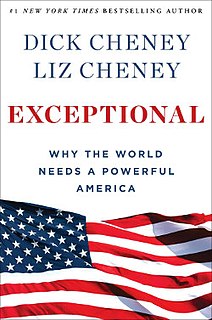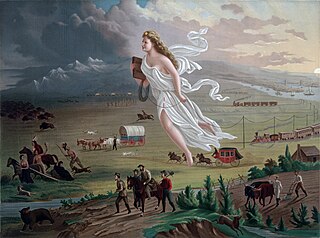 W
WAmerican exceptionalism is the idea that the United States is inherently different from other nations. Its proponents argue that the values, political system, and historical development of the U.S. are unique in human history, often with the implication that the country "is both destined and entitled to play a distinct and positive role on the world stage."
 W
WAmerica Right or Wrong: An Anatomy of American Nationalism is a 2012 book by the British author and academic Anatol Lieven. A separate, earlier version was published in 2004.
 W
WThe American Dream is a national ethos of the United States, the set of ideals in which freedom includes the opportunity for prosperity and success, as well as an upward social mobility for the family and children, achieved through hard work in a society with few barriers. In the definition of the American Dream by James Truslow Adams in 1931, "life should be better and richer and fuller for everyone, with opportunity for each according to ability or achievement" regardless of social class or circumstances of birth.
 W
WThe American way of life or the American way refers to the American nationalist ethos that adheres to the principle of life, liberty and the pursuit of happiness. At the center of the American way is the belief in an American Dream that is claimed to be achievable by any American through hard work. This concept is intertwined with the concept of American exceptionalism, the belief in the unique culture of the nation.
 W
WBioShock Infinite is a first-person shooter video game developed by Irrational Games and published by 2K Games. It was released worldwide for the Microsoft Windows, PlayStation 3, Xbox 360, and OS X platforms in 2013, and a Linux port was released in 2015. Infinite is the third installment in the BioShock series, and though it is not immediately part of the storyline of previous BioShock games, it features similar gameplay concepts and themes. Irrational Games and creative director Ken Levine based the game's setting on historical events at the turn of the 20th century, such as the 1893 World's Columbian Exposition, and based the story on the concept of American exceptionalism, while also incorporating influences from more recent events at the time such as the 2011 Occupy movement.
 W
WThe End of History and the Last Man (1992) is a book of political philosophy by American political scientist Francis Fukuyama which argues that with the ascendancy of Western liberal democracy—which occurred after the Cold War (1945–1991) and the dissolution of the Soviet Union (1991)—humanity has reached "not just ... the passing of a particular period of post-war history, but the end of history as such: That is, the end-point of mankind's ideological evolution and the universalization of Western liberal democracy as the final form of human government." For the book, which is an expansion of his essay, "The End of History?" (1989), Fukuyama draws upon the philosophies and ideologies of Georg Wilhelm Friedrich Hegel and Karl Marx, who define human history as a linear progression, from one socioeconomic epoch to another.
 W
WExceptional: Why the World Needs a Powerful America is a 2015 book on American foreign policy co-authored by Dick Cheney, who served as the 46th Vice President of the United States from 2001 to 2009, and his daughter, Liz Cheney, a former official of the United States Department of State. The book offers a vehement criticism of President Barack Obama's foreign policy, and an unwavering defense of the virtue of American exceptionalism.
 W
W"Make America Great Again" or MAGA is a campaign slogan used in American politics popularized by Donald Trump in his successful 2016 presidential campaign. Ronald Reagan used the similar slogan "Let's Make America Great Again" in his successful 1980 presidential campaign. Bill Clinton also used the phrase in speeches during his successful 1992 presidential campaign and used it again in a radio commercial aired for his wife Hillary Clinton's unsuccessful 2008 presidential primary campaign. Douglas Schoen has called Trump's use of the phrase "probably the most resonant campaign slogan in recent history", citing majorities of Americans who believed that the country was in decline.
 W
WManifest destiny was a widely held cultural belief in the 19th-century United States that American settlers were destined to expand across North America. There are three basic themes to manifest destiny:The special virtues of the American people and their institutions The mission of the United States to redeem and remake the west in the image of the agrarian East An irresistible destiny to accomplish this essential duty
 W
WSlavery as a positive good was the prevailing view of white Southern U.S. politicians and intellectuals just before the American Civil War, as opposed to seeing it as a crime against humanity or even a necessary evil. They defended the legal enslavement of people for their labor as a benevolent, paternalistic institution with social and economic benefits, an important bulwark of civilization, and a divine institution similar or superior to the free labor in the North.